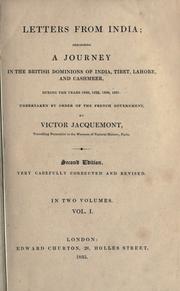Buy this book

A delightful collection of letters written on travels around the Cape of Good Hope to Kolkata and then to Shimla and central Asia over several years beginning in 1828.
Victor Jacquemont himself is perceptive and witty.
There's also an amusing subplot: Jacquemont's London editor competes with his Parisian counterpart.
Buy this book

Previews available in: English
Subjects
Rio de Janeiro, Cape of Good Hope, Teneriffe, Kolkata, Delhi, Shimla, Description and travel, India, description and travelTimes
1828Showing 3 featured editions. View all 3 editions?
| Edition | Availability |
|---|---|
|
1
Letters from India: describing a journey in the British dominions of India, Tibet, Lahore, and Cashmere, during the years 1828, 1829, 1830, 1831, undertaken by order of the French government
1979, Oxford University Press
in English
0195772164 9780195772166
|
cccc
Libraries near you:
WorldCat
|
|
2
Letters from India: describing a journey in the British dominions of India ... during the years 1828, 1829, 1830, 1831.
1835, E. Churton
in English
- 2d ed. Very carefully corrected and revised.
|
bbbb
Libraries near you:
WorldCat
|
| 3 |
aaaa
|
Book Details
Published in
London
Classifications
ID Numbers
Excerpts
In giving an English translation of Victor Jacquemont's Letters to his family and friends, during his travels in India, we shall endeavour to supply an omission in the French edition of the Work, by stating a few particulars of the life of this interesting young victim to science....
The three brothers received an excellent education such as one, in short as may be given in the public institutions of France, where instruction is not limited to a knowledge of the ancient classics, but combines them with that practical and scientific information which renders a man a useful member of society
To point out the rivalry between the two editors and to lament that I never did learn what made Jacquemont a "victim to science."
See what I mean?
Given how droll Jacquemont's letters turned out to be, perhaps he and his editor were sharing an inside joke.
I here saw, for the first time, negro slavery, on an immense scale, forming the key-stone of society. In twenty days, I saw several vessels arrive from the coast of Africa, laden with these miserable creatures, afflicted with dreadful diseases, crowded together on landing, penned in like animals, and side by side with these horrors, the most refined luxuries of European civilisation. The Portuguese, like the Spaniards, feel not the contempt, the physical repugnance towards negroes, which few English or French can resist. They have not instituted against them, that system of refined humiliation adopted by the colonists of Jamaica and the Leeward Islands; though they are not less violent and merciless masters. Under their whip, the negroes live a few years, and then die without leaving children. The disposition of this unhappy race of men must be very mild, innocent, and timid, for vengeance and crime not to be more common at Rio, than they are.
The masters, with their polished, and even elegant, European manners, are, in many respects, as much debased by slavery as the brutified negroes. I saw them with each a golden key on his coat, with their diamonds, and their ribands, and their titles, and their ignorance, baseness, and dishonesty--and I was disgusted.
I got the sense that seeing the slaves changed his paradigms.
On the previous page he cracked lighthearted jokes about the ship's food. Then he saw the slaves. Everything changed. He continued to make jokes, but even his humor grew darker. He revisited the subject again and again.
The afflicting question of slavery constantly recurs to my mind. Had you, like me, seen the sales of slaves at Rio, you would be unceasingly tormented by the recollection of them
The colossal extension of the British power is a blessing. There are doubtless many iniquities, many odious falsehoods in the national and colonial government of that nation, but it proscribes atrocities everywhere.
Because it's about a pirate attack!
Because he sounds like a such a McGyver: adroit and down-to-earth at the same time. If I'm ever injured in a pirate attack, I want Jacquemont helping out.
This latter disciplines his little army in the European fashion, and almost all his officers are French.
Laugh intensely at * * * in my name and at his accidents by flood and field. Tell him that I am several months without hearing the sound of a European voice, also that my dinner is fundamentally detestable;--and that I do not complain..
Community Reviews (0)
Feedback?| January 17, 2023 | Edited by ImportBot | import existing book |
| July 22, 2019 | Edited by MARC Bot | remove fake subjects |
| November 18, 2018 | Edited by MARC Bot | import existing book |
| December 4, 2015 | Edited by Katharine Hadow | overview + excerpts |
| December 10, 2009 | Created by WorkBot | add works page |












